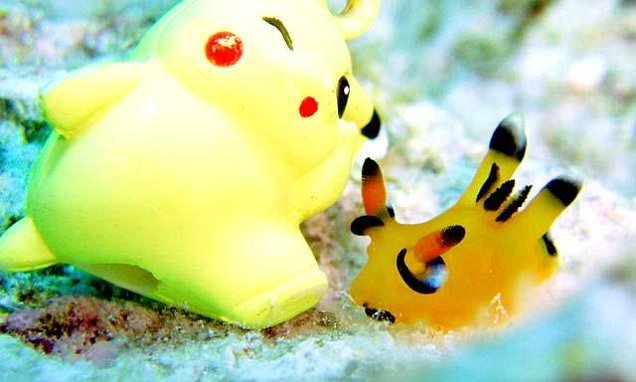The real-life Pokémon: 'Pikachu sea slug' becomes viral hit in Japan

With its cartoonish yellow body and black-tipped ‘ears,’ it’s no wonder that one adorable sea slug has gained a legion of new fans among Pokémon Go players in Japan.
The brightly-coloured slug bears a striking resemblance to Pikachu, and many claim it is the real-life inspiration for the beloved character.
Though it’s formally called thecacera pacifica, this marine creature has now become more commonly known by its nickname – the ‘Pikachu sea slug.’
Scroll down for video
The brightly-coloured slug bears a striking resemblance to Pikachu, and many claim it is the real-life inspiration for the beloved character. Fans have taken to social media to express their excitement through emojis and side-by-side comparisons
THE ‘REAL’ PIKACHU
Pikachu is the most well-known Pokémon, dating back to the early games and anime series in the 1990s.
The character is a bright yellow electric rodent with black-tipped ears, red cheeks, and a lightning bolt shaped tail.
Pikachu is now among the many creatures that can be caught in the new augmented reality game, Pokémon Go.
Scientists have long known about the existence of thecacera pacifica, but the sea slug’s popularity has been reignited after it was featured on a television segment by Japanese teacher-celebrity Osamu Hayashi, according to RocketNews24.
Fans have taken to social media to express their excitement through emojis and side-by-side comparisons of the real-life and fictional creatures.
Just like Pikachu, the slug has a bright yellow body that’s accented with black markings, including at the tip of its ear-like rhinophores.
Along with this, it also has patches of blue at the end of its tail and along other areas of the body.
This sea slug typically inhabits the Indian and Pacific oceans, and can be found along coastal regions in Japan, including the Izu Peninsula, Bonin Islands, and Yakushima.
And, the Pikachu sea slug isn’t the only creature in the ocean that looks as though it belongs in a cartoon.
With its cartoonish yellow body and black-tipped ‘ears,’ it’s no wonder why one adorable sea slug has gained a legion of new fans among Pokémon Go players in Japan. Just like Pikachu, the slug has a bright yellow body that’s accented with black markings
VIRTUAL POKEMON INTERACT WITH REAL ENVIRONMENTS
Engineers from MIT’s Computer Science and Artificial Intelligence Lab (CSAIL) have shown off a new technology that lets objects such as Pokémon interact with their environments in specific, realistic ways, such bouncing off the leaves of a nearby bush.
The simulation system could also reduce the need for CGI green-screens when making movies.
The technology, called Interactive Dynamic Video (IDV), lets users reach in and ‘touch’ objects in videos by using traditional cameras and algorithms to pay attention to the tiny, almost invisible vibrations of an object and create simulations that users can virtually interact with.
To simulate objects, the engineers analysed video clips to find ‘vibration modes’ at different frequencies that each represent the different ways an object can move.
By identifying these shapes, the researchers could begin to predict how these objects would move in new situations.
They used IDV on videos showing different of objects, including a bridge, a jungle gym and a ukulele, showing they can push and pull and image to make it wobble and bend and move it in different directions.
In this way, Pikachu can land on a ‘real’ bush and make it rustle.
Just last week, researchers revealed a big-eyed purple squid spotted by the E/V Nautilus that left even scientists amazed by its appearance.
The team determined the cephalopod was a Stubby squid — also known as Rossia pacifica — which is closely related to cuttlefish, according to a description of the video posted by the team that captured the footage.
In footage of the discovery, the team can be heard dissolving into laughter while watching the animal.
The amazing video of the googly-eyed squid has gone viral after it was spotted off the coast of California by a research vessel. Stubby squid live in the Northern Pacific between Japan and Southern California, and are usually spotted at a depth of about 300 meters.
The amazing video of the googly-eyed squid has gone viral after it was spotted off the coast of California by a research vessel. Stubby squid live in the Northern Pacific between Japan and Southern California, and are usually spotted at a depth of about 300 meters.
‘They look like googly eyes … It looks so fake!’ one woman exclaims in the video.
‘It’s like some little kid dropped their toy.’
It was spotted in Trask Knoll, a NW-SE elongated hill located south of Santa Rosa Island, in the outer California borderland.
This feature is about 20 km-long and ~400 m-high, and little is known about it, except that it appears to be bounded to the west by a fault, the Trask Knoll fault.
Earlier studies indicate that Miocene sedimentary rocks cover most of Trask Knoll, but at the center is a metamorphic rock of unknown age.
Plagiarism.
Source:
http://www.dailymail.co.uk/sciencetech/article-3742314/Did-lost-way-Sesame-Street-Researchers-spot-bizarre-googly-eyed-stubby-squid-900-feet-sea-floor-California.html
Flagged.